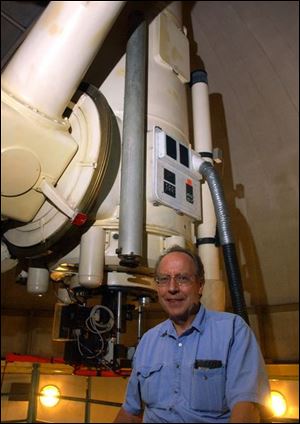
Long-term plan paying off for UT
7/2/2004
Adolf Witt, a distinguished professor of astronomy, is conducting research on cosmic dust with the backing of a three-year, $250,000 grant from the National Science Foundation.
Everything in the universe comes down to dust for Adolf Witt.
Asteroids. Planets. You and me.
"The Earth and moon are ultimately made of cosmic dust, and so are we to a large extent," he explains. "At the time of a funeral, when they say, 'from dust to dust,' this is literally a correct description."
The distinguished professor of astronomy at the University of Toledo spends his time studying the small particles, called interstellar dust, that are the building blocks for most large cosmic bodies and serve as the basis for the chemistry of life. A three-year, $250,000 grant from the National Science Foundation helps make his work possible.
With the university's increased focus on research in recent years, its faculty is bringing home checks like that more and more often.
In fact, UT set a record this year for the amount of external research grants it received. For the fiscal year that ended Wednesday, officials said they brought in $32.2 million, well above the record of $27.2 million set last year and more than double what they had five years ago.
That is particularly good news for an institution that has decided it again wants to double its research dollars over the next five years.
"It's been a long process," said Frank Calzonetti, vice provost for research. "In addition to senior people continuing to be successful, some of the more junior faculty members have really stepped up and started winning
some of the research proposals."
The most recent survey by the Association of University Technology Managers shows that UT was above the University of Akron, Medical College of Ohio, Kent State University, and Bowling Green State University in research expenditures during fiscal year 2002.
Preliminary figures show that BGSU totaled a little over $16 million in grants this year, according to Cynthia Price, associate vice provost of research administration.
At UT, the stability of the last few years, during which numerous deans and department chairmen have been put in place on a permanent basis, has helped. So has a focus on creating an identity for the university and finding research niches where it can be most competitive, Mr. Calzonetti said.
The areas of strength currently identified by UT are: astronomy and astrophysics, biotechnology, environmental research, geographic information systems and remote sensing, advanced films and coatings, and science and technology education.
During the next 10 years, a university hiring plan calls for adding 100 tenure-track faculty, and the expectation is that many will be active in research.
Brian Ashburner, an assistant professor in biological sciences, joined UT three years ago with a focus on cancer biology. He believes the administration's commitment to hire more researchers will do more than just bring in more grant dollars.
"If we can continue to hire people in this area who have real solid research backgrounds, it's going to help bring in higher quality undergraduates and graduate students," he said.
Moreover, it will become a more attractive place for faculty members like himself to stay, he said.
Mr. Ashburner has a grant from the Ohio division of the American Cancer Society to study NF-kappaB, a protein that allows cancerous cells to survive and is the target of several cancer drugs. He is studying how it functions on a molecular level in the hope the knowledge can be used to better develop drugs.
The biggest challenge to continued success in research at UT will be research space in facilities. There also could be a downturn in the short term as researchers complete their current work before seeking new grants, Mr. Calzonetti said.
But the way things are going, it's sort of a promise fulfilled for researchers like Mr. Witt, a longtime UT professor who is delighted at the prospect of new young colleagues.
"Some of us who have been here for a long time, we were brought here in order to establish this kind of culture," he said. "This is what we have been working for for the last 35 years."
Contact Ryan E. Smith at:
ryansmith@theblade.com
or 419-724-6074.